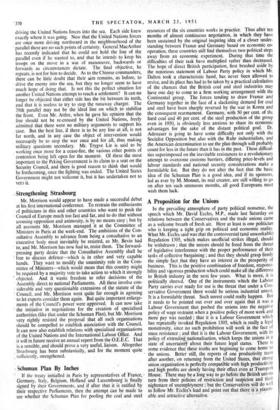Strengthening Strasbourg
Mr. Morrison would appear to have made a successful debut at his first international conference. To restrain the enthusiasms of politicians in this and other countries who want to push the Council of Europe much too fast and far, and to do that without arousing opposition and animosity, is by no means easy ; but by all accounts Mr. Morrison managed it at the Committee of Ministers in Paris at the week-end. The ambitions of the Con- sultative Assembly to advance from being a consultative to an executive body must inevitably be resisted, as Mr. Bevin had to, and Mr. Morrison has now had to, resist them. The forward- pressing party desire that the Consultative Assembly shall be ' free to discuss defence—which is in other and very capable hands. They want to modify the unanimity rule in the Com- mittee of Ministers—which would mean that this country might be required by a majority vote to take action to which it strongly objected. And it wants freedom to refer decisions of the Assembly direct. to national Parliaments. All these involve con- . siderable and very questionable extensions of the statute of the ' Council, and Mr. Morrison went quite far enough in agreeing to let experts consider them again. But quite important enlarge- ments of the Council's power were approved. It can now take ' the initiative in negotiations for the creation of specialised authorities (like that under the Schuman Plan), but Mr. Morrison very rightly resisted the proposal that all such organisations should be compelled to establish association with the Council. It can now also establish relations with specialised organisations of the United Nations and the International Labour Office. And it will in future receive an annual report from the O.E.E.C. That is a sensible, and should prove a very useful, liaison. Altogether Strasbourg has been substantially, and for the moment quite sufficiently, strengthened.


































 Previous page
Previous page